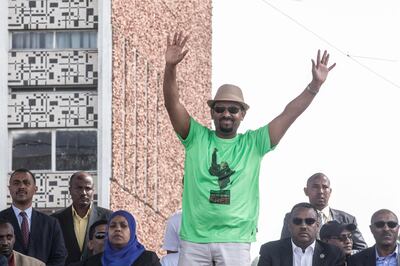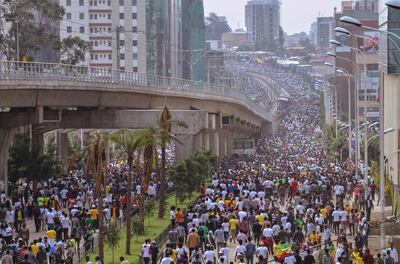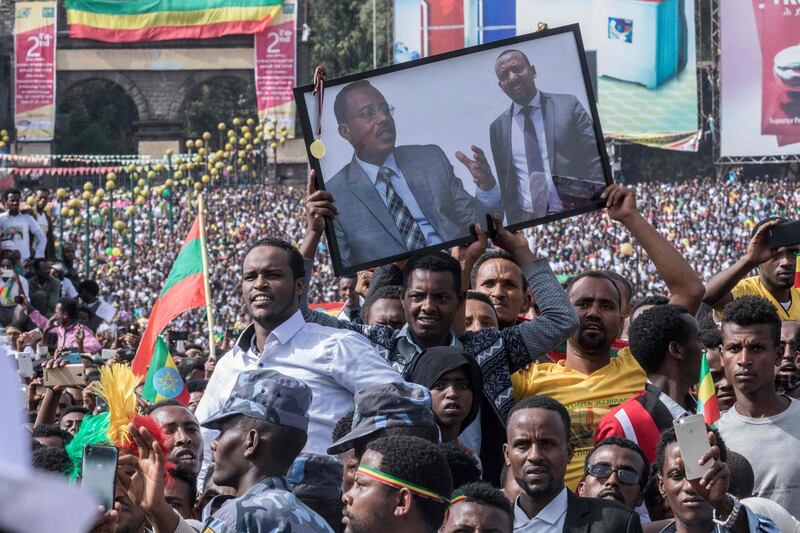Barely two months in office, and the new prime minister of Ethiopia is turning the country's politics and economy upside down.
The 42-year-old Abiy Ahmed took office in April, and quickly moved to shake up an administration that had gone a bit slack. A restive population, low job creation and crippling debt pointed to a desperate need for fresh ideas for the ruling coalition Ethiopian People's Revolutionary Democratic Front (EPRDF).
Mr Ahmed it seems, is determined to come up with few of them.
"The crux of the matter is to catapult our country to a higher level of development and move forward, while ensuring that its unity is secured on a sustainable basis," he said in his inaugural parliamentary speech.

The longstanding state of emergency that restricted personal freedoms was lifted; the state of war with neighbouring Eritrea is also about to end following diplomatic overtures from Addis Ababa.
"What is happening in Ethiopia right now could be one of the most significant shifts in government policy that this region has seen for decades," says Christopher Hockey, Head of Information at WS Insight, a Mauritius-based firm that focuses on security in Africa.
On June 5 Ethiopia said it will fully accept the terms of a peace agreement with Eritrea, a major step towards calming tensions with its decades-long rival. Addis Ababa is also trying to extend its economic influence by approaching Somalia to develop up to four ports along the Somalian coast.
Mr Ahmed has also pledged to settle a simmering dispute with Egypt over the Nile's waters, which could be affected by the Grand Renaissance Dam, Ethiopia’s US$4 billion hydroelectric project.
"Politically, Ethiopia is seeking to become a regional powerhouse and cannot do so whilst still at loggerheads with its neighbours," Mr Hockey said. "Beyond this, Mr Ahmed deserves substantial credit for bringing Ethiopia back from the brink of autocracy."

The government also wants to reform an economy heavily dependent on agriculture and struggling with ongoing shortage of foreign currency. It has enjoyed one of the world's fastest growth rates, with gross domestic product expanding at more than 10 per cent a year for the past decade. Yet there is the ever-present risk that a single disruption such as drought could destroy growth, particularly in its all-important farming sector, which counts for up to 45 per cent of GDP, according to the World Bank.
The outbreak of violence earlier this week is also a worrying sign for Africa's fastest-growing, largely agrarian economy. At least two people were killed in an explosion at a rally for Mr Ahmed, who escaped unharmed. Media reports citing an organiser of the event in the Ethiopian capital said a member of the crowd had tried to hurl a grenade at the stage.
"We are the fastest growing economy in Africa, but we can not hope to keep this up if we only depend on agriculture," said Motuma Mekassa, formerly mining minister who has now take control of the key portfolio of defence. Speaking to The National on the side-lines of a mining symposium in Cape Town earlier this year, Mr Mekassa said the country had begun setting itself up to become a modern, diverse economy.
Already there are signs that the current level of growth can not be sustained. According to a World Bank assessment in June, Ethiopia’s GDP growth rate will decrease by 1.3 per cent in the current fiscal year.
In the decade prior to Mr Ahmed becoming prime minister, Ethiopia had begun building power stations, laying railway infrastructure and even investing in ports in neighbouring countries.
Ethiopia also wants to end its unusual status as one of the few African countries not to have a significant mining sector.
Mr Mekassa says initial exploration had shown gold, diamonds and industrial minerals could form the basis of a mining industry, which now only accounts for 1 per cent of the country's GDP.
_______________
Read more:
[ UAE pledges Dh11 billion in economic aid to Ethiopia ]
[ It might be too early to declare an African Spring – but leaders are being toppled in their droves ]
_______________
"By developing our natural-resources we believe our economy will keep growing, and that by 2025 we will be a middle-income economy."
Already, Ethiopia is Africa's third-largest economy, trailing Nigeria and South Africa. It could soon join the two as the only countries on the continent with GDPs in excess of $100bn.
Mr Ahmed's plans for sustaining growth and adding diversity includes privatisation of state assets including Ethiopian Airways and Ethio Telecom.
A full picture of how comprehensive the the government's privatisation drive will be is yet to emerge, but Mr Ahmed's administration has begun teasing out some details. It plans to split Ethio Telecom into two competing telecommunications operators.

This model, is similar to the one followed by the emirates of Dubai and Abu Dhabi, which have their own independent set up rival companies Du and Etisalat.
Eventually, a stake of up to 40 per cent will be sold to foreign investors, says George Kalebaila, a research director for telecommunications and the internet of things at International Data Corporation, in Johannesburg. Telecom operators, bullish on the country's economic story, including the UAE telecoms firms will be closely watching, he says.
"Etisalat and other Gulf operators will be looking at this. Ethiopia is in their neighbourhood, and close to their base of operations so it’s a natural fit."
While Etisalat's earlier African venture in Nigeria had gone poorly, ending with the UAE firm withdrawing from the country last year, this would not deter it from eyeing a stake in the lucrative Ethiopian market. "Etisalat would have learned from its mistakes, and Ethiopia is too great an opportunity to pass up," Mr Kalebaila points out.
The operators from the UAE, the second-biggest Arabian Gulf economy, may also be more interested in Ethiopian market in the wake of warming up of relations with the UAE.
In June, Abu Dhabi's Crown Prince Sheikh Mohammed bin Zayed paid a visit to Addis Ababa. He deposited $1bn in the Ethiopian banking system, helping alleviate an acute foreign currency shortage, while also pledging a further $2bn in investments.
Chinese operators may also look to cash in on the Beijing's existing relations with Ethiopia. Chin has heavily invested in roads, railway and industrial parks over the past decade, and it is encouraging Chinese firms to set up businesses and factories in Ethiopia.
However, the front of the pack for the telecoms licences will be South African rivals Vodacom and MTN, Mr Kalebaila says. Ethiopia has a population of more than 100 million people, which makes it Africa's second most populous country after Nigeria. Around 40 per cent of its people are under the age of 15, a tantalizing market for the South African firms.
"Let's be honest about it – it's these companies that are Africa's largest mobile firms, they understand the regulatory environment and have learned to navigate it," Mr Kalebaila adds.
MTN has already indicated its eagerness to enter the Ethiopian market.
"Ethiopia presents many exciting telecommunication opportunities and we look forward to further discussions with that nation’s authorities on potential partnerships and opportunities," the mobile network provider said in a statement.
Ethiopia Airways will also be at the top of the wish-list of potential investors. It is the only airline in Africa to have more than 100 Airbus aircraft, making it the continent's largest carrier. So fast and far has Ethiopian airline come, that rivals South African carrier and Kenya Airways are considering teaming up to boost their competitiveness against Ethiopia's growing threat to their business.
Still, some questions remain over just how far Mr Ahmed can go. The military for instance remains a powerful force, both politically and in business. It is deeply embedded across sectors, ranging from construction to agriculture.
In one of his first acts after taking office Mr Ahmed signalled his intent to separate military from civilian life. The state-run Ethiopia Sugar Corporation had initially taken on a military contractor to develop a farm and processing factory in Ethiopia’s Amhara region. The deal has seen numerous protests over the past two years by local residents who say they were being excluded from its economic benefits such as jobs.
Mr Ahmed has taken the project away from the army and said it would now be developed by an outside party, most likely a foreign contractor. More such conflicts will probably occur as the prime minister’s reforms gather momentum.
Internal politics of the coalition EPRDF could also complicate economic reformation. "Mr Ahmed has been able to announce these reforms because of the changing dynamics within the ruling coalition," said Barnaby Fletcher, a senior Southern Africa analyst at global risk consultancy, Control Risks. "Mr Ahmed himself has shown signs that he will prioritise political expediency over economic considerations."
The prime minister has also been elected president by the EPRDF to help settle internal tensions that reflected wider, regional and ethnic strife across Ethiopia. His origins lie in the Oromia region, which has a long history of conflict and grievance with the central government. Mr Ahmed’s rise to the presidency was, in no small part, intended to help bring peace to the troubled region.
He, however, will have to carefully manage his relationship with the EPRDF’s traditionally dominant coalition partner, the Tigray People’s Liberation Front, Mr Fletcher says.
For now, though Mr Ahmed appears set on a pragmatic course to open the economy and wind down tensions both internally and with Ethiopia’s neighbours.
“Many of the seemingly dramatic reforms announced by Prime Minister Abiy Ahmed are little more than obvious solutions to the challenges Ethiopia is facing,” Mr Fletcher adds.






